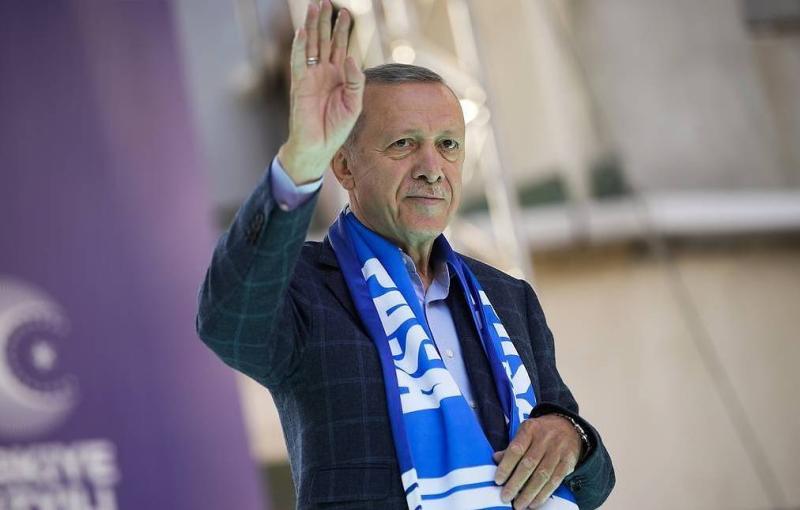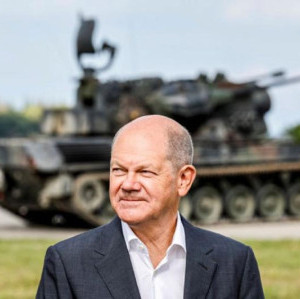
© AP Photo/Emrah Gurel/TASS
Turkey’s Recep Tayyip Erdogan was elected for his third consecutive presidential term on Sunday.
He will take the oath in the year when the country celebrates the 100th anniversary of the Republic of Turkey.
Ahmet Yener, who heads Turkey’s highest election authority, the Supreme Election Council, said late on Sunday that with 99.43% of the ballots counted, Tayyip Erdogan gets 52.14%, and Kemal Kilicdaroglu - 47.86%.
The Anadolu news agency said around 400,000 votes that have not yet been processed by the system will have no effect on the outcome.
Turkey’s highest election authority, the Supreme Election Council, plans to announce the official results of the presidential elections and the May 14 parliamentary elections by June 1.
Erdogan, 69, was first elected as the president of Turkey in 2014 and re-elected to the post in 2018. So far, only the first three presidents of Turkey were elected to three consecutive presidential terms - the founder of the republic Mustafa Kemal Ataturk (1923-1938, four terms), his successor Mustafa Ismet Inonu (1938-1950, four terms) and Mahmud Celaleddin ‘Celal’ Bayar (1950-1960, three terms).
Background and education
Erdogan was born in Istanbul on February 26, 1954, in the family of a Turkish Coast Guard officer. He spent his childhood in the northeastern Turkish city of Rize, where his parents settled after moving from Georgia.
After graduating from a religious high school, Erdogan continued his education in Istanbul, graduating from the Marmara University in 1981 with a degree in business administration. Between 1980 and 1982 he worked as a manager in private companies. He completed his military service in 1982.
Way to the top
During his student years, Erdogan joined the Islamist National Salvation Party (MSP) and headed its youth branch in Istanbul's Beyoglu district in 1976. In 1985 he was promoted to chair of the party’s Istanbul city branch.
Political parties were disbanded after the 1980 military coup, but in 1983 Erdogan joined the newly-formed Islamist Welfare Party and headed its Istanbul branch in 1984. In 1985-1986, he was a member of the party’s central administrative council.
In 1989 he was appointed the administrative head of Istanbul’s Beyoglu district.
In March 1994, Erdogan was elected the mayor of Istanbul and was very popular at the post, resolving a number of economic and social issues, such as sewage, garbage disposal and recycling.
Promoting Islamic values, Erdogan imposed certain restrictions on sales of alcohol in the city. In January 1998, the Welfare Party was banned as the country’s Constitutional Court ruled that it violated the principle of secularism, and Erdogan had to resign from the post of the mayor.
Prison term and own party
In the same year of 1998, Erdogan was charged with inciting ethnic discord and enmity after reciting a poem by Ziya Gokalp, a pan-Turk activist of the early 20th century. Although the poem was not outlawed, the court ruled that it had improper Islamist content and sentenced the young politician to ten months in prison. However, Erdogan was released after spending four months behind bars.
In 1998, Erdogan joined the Virtue Party. After it was banned on charges of using religion for political means, he founded his own Justice and Development Party (AKP), bringing together Islamic conservatives, center-right forces and businessmen.
During the parliamentary elections in November 2002, AKP received 34.3% of the vote and got an opportunity to form a government. Due to his previous conviction, Erdogan could not become a member of the parliament or the government. As a result, the government was formed by AKP deputy chairman Abdullah Gul. Erdogan became a lawmaker in March 2023, after the ban on electing previously convicted citizens to the parliament was cancelled.
At the post of prime minister
On March 14, 2003, the parliament approved Erdogan as the country’s prime minister, appointing him to the top position in the parliamentary republic. Erdogan remained in the office until August 28, 2014.
During this period, the country’s GDP almost tripled (grew by 2.7 times), from $303 billion in 2003 to $820 billion in 2013. In 2005, the country revaluated its national currency, the Turkish lira. Inflation contracted from 45% in 2003 to 7.5% in 2013.
Erdogan made several attempts to settle the decades-long conflict with Kurdish separatists. A peace process was launched in spring 2013, but was halted in the summer of 2015 after the Turkish Air Force attacked Kurdish bases.
Erdogan also toughened control over the country’s armed forces, as a few dozens of military officers were arrested and convicted on charges of plotting military coups. In the summer of 2013, the police dispersed anti-government protests in Istanbul and other Turkish regions. The country’s authorities made several attempts to block Twitter, YouTube and Facebook (outlawed in Russia; owned by US corporation Meta that is outlawed as an extremist organization in Russia). In this regard, Erdogan was often criticized for authoritarianism and attempts to restrict the freedom of speech.
During his tenure as the prime minister, Erdogan publicly supported the initiative to turn the country into a presidential republic. In 2007, the Turkish constitution was amended to introduce direct nationwide presidential elections. Prior to that, the president was appointed by the parliament.
The president of Turkey
On August 10, 2014, Erdogan won Turkey’s first presidential election in the first round, receiving 51.8% of the vote. His main rival Ekmeleddin Ihsanoglu, nominated by a coalition of opposition parties, received 38.5%.
During his first presidential term, Erdogan continued the policy of promoting Islamic values and of weakening the country's powerful military. As a result, a military coup occurred on July 15, 2016, but was quelled with the support of the population and loyal military units. The coup was blamed on Turkish scholar Fethullah Gulen, who resides in the United States, but has many supporters among Turkish military and police officers. A state of emergency was declared in the country and remained in place until July 19, 2018. More than 13,000 people were detained for suspected involvement in the coup.
After that, the president reformed the country’s military command system. Subsequently, a referendum was held on April 16, 2017 to amend the constitution and make Turkey a presidential republic. A total of 51.41% of voters supported the proposal. The turnout was 87.2%.
On June 24, 2018, Erdogan was elected to his second presidential term, getting 52.59% of the vote in the first round. His main election rival, Muharrem Ince, got 30.64%. Erdogan was sworn in as the president of Turkey on July 9, 2018.
Foreign policy
The period of Erdogan’s presidency was marked by a tough approach to the Kurdish issue. In December 2015 - February 2016, the Turkish armed forces carried a large-scale operation against the Kurdistan Workers' Party in the cities of Cizre and Silopi on the border with Syria and Irak. Besides, Ankara carried out three cross-border military operations on the Syrian territory against "terrorist groups of Syrian Kurds, who pose a threat to Turkey" - Operation Euphrates Shield (2016-2017), Operation Olive Branch (2018) and Operation Peace Spring (2019). As a result, the Turkish military seized control over a stretch of the Turkish-Syrian border between the cities of Azaz and Jarabulus, and a district adjacent to the city of Afrin.
Erdogan declared his country’s integration into the European Union to be his main foreign policy objective. Turkey filed the bid in 1987 and got the candidate status in 1999. However, Europe criticized Ankara’s policies in the sphere of human rights and freedom of expression. In 2017, Erdogan said his country no longer needs EU membership, but the negotiation process that was launched in 2005 continues to date.
Erdogan’s second presidential term is known for tensions in Ankara’s relations with the West. For example, the United States suspended the country’s participation in the Joint Strike Fighter aircraft project following Turkey’s purchase of S-400 Triumph air defense systems from Russia. In 2019-2020, the United States imposed sanctions on a number of Turkish governmental agencies and officials, including the Defense Ministry and its head Hulusi Akar, citing the Peace Spring military operation in Syria and the S-400 contract with Russia as the reason.
Personal information
Since 1978, Erdogan has been married to Emine Erdogan (nee Gulbaran), a women’s rights and charity activist. They have four children.
In 2005, 2010, 2016 and 2016, Erdogan was included into the Time magazine’s list of the world’s most influential persons. In 2022, he was awarded the Supreme Order of Turkic World, which is the highest order of the Organization of Turkic States.









